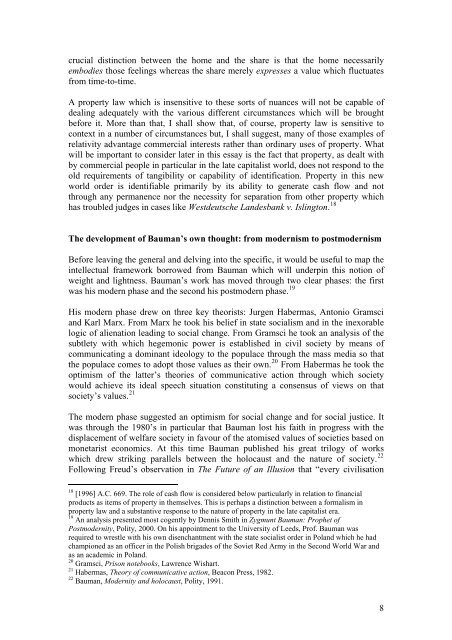The Unbearable Lightness of Property - alastairhudson.com
The Unbearable Lightness of Property - alastairhudson.com
The Unbearable Lightness of Property - alastairhudson.com
You also want an ePaper? Increase the reach of your titles
YUMPU automatically turns print PDFs into web optimized ePapers that Google loves.
crucial distinction between the home and the share is that the home necessarily<br />
embodies those feelings whereas the share merely expresses a value which fluctuates<br />
from time-to-time.<br />
A property law which is insensitive to these sorts <strong>of</strong> nuances will not be capable <strong>of</strong><br />
dealing adequately with the various different circumstances which will be brought<br />
before it. More than that, I shall show that, <strong>of</strong> course, property law is sensitive to<br />
context in a number <strong>of</strong> circumstances but, I shall suggest, many <strong>of</strong> those examples <strong>of</strong><br />
relativity advantage <strong>com</strong>mercial interests rather than ordinary uses <strong>of</strong> property. What<br />
will be important to consider later in this essay is the fact that property, as dealt with<br />
by <strong>com</strong>mercial people in particular in the late capitalist world, does not respond to the<br />
old requirements <strong>of</strong> tangibility or capability <strong>of</strong> identification. <strong>Property</strong> in this new<br />
world order is identifiable primarily by its ability to generate cash flow and not<br />
through any permanence nor the necessity for separation from other property which<br />
has troubled judges in cases like Westdeutsche Landesbank v. Islington. 18<br />
<strong>The</strong> development <strong>of</strong> Bauman’s own thought: from modernism to postmodernism<br />
Before leaving the general and delving into the specific, it would be useful to map the<br />
intellectual framework borrowed from Bauman which will underpin this notion <strong>of</strong><br />
weight and lightness. Bauman’s work has moved through two clear phases: the first<br />
was his modern phase and the second his postmodern phase. 19<br />
His modern phase drew on three key theorists: Jurgen Habermas, Antonio Gramsci<br />
and Karl Marx. From Marx he took his belief in state socialism and in the inexorable<br />
logic <strong>of</strong> alienation leading to social change. From Gramsci he took an analysis <strong>of</strong> the<br />
subtlety with which hegemonic power is established in civil society by means <strong>of</strong><br />
<strong>com</strong>municating a dominant ideology to the populace through the mass media so that<br />
the populace <strong>com</strong>es to adopt those values as their own. 20 From Habermas he took the<br />
optimism <strong>of</strong> the latter’s theories <strong>of</strong> <strong>com</strong>municative action through which society<br />
would achieve its ideal speech situation constituting a consensus <strong>of</strong> views on that<br />
society’s values. 21<br />
<strong>The</strong> modern phase suggested an optimism for social change and for social justice. It<br />
was through the 1980’s in particular that Bauman lost his faith in progress with the<br />
displacement <strong>of</strong> welfare society in favour <strong>of</strong> the atomised values <strong>of</strong> societies based on<br />
monetarist economics. At this time Bauman published his great trilogy <strong>of</strong> works<br />
which drew striking parallels between the holocaust and the nature <strong>of</strong> society. 22<br />
Following Freud’s observation in <strong>The</strong> Future <strong>of</strong> an Illusion that “every civilisation<br />
18 [1996] A.C. 669. <strong>The</strong> role <strong>of</strong> cash flow is considered below particularly in relation to financial<br />
products as items <strong>of</strong> property in themselves. This is perhaps a distinction between a formalism in<br />
property law and a substantive response to the nature <strong>of</strong> property in the late capitalist era.<br />
19 An analysis presented most cogently by Dennis Smith in Zygmunt Bauman: Prophet <strong>of</strong><br />
Postmodernity, Polity, 2000. On his appointment to the University <strong>of</strong> Leeds, Pr<strong>of</strong>. Bauman was<br />
required to wrestle with his own disenchantment with the state socialist order in Poland which he had<br />
championed as an <strong>of</strong>ficer in the Polish brigades <strong>of</strong> the Soviet Red Army in the Second World War and<br />
as an academic in Poland.<br />
20 Gramsci, Prison notebooks, Lawrence Wishart.<br />
21 Habermas, <strong>The</strong>ory <strong>of</strong> <strong>com</strong>municative action, Beacon Press, 1982.<br />
22 Bauman, Modernity and holocaust, Polity, 1991.<br />
8













